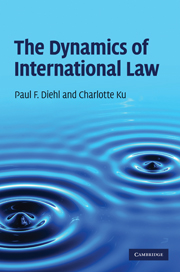Book contents
- Frontmatter
- Contents
- Acknowledgements
- 1 Introduction
- 2 A new framework for analysis and a model for legal change
- 3 The influence of normative change on the operating system
- 4 Extra-systemic adaptations to systemic imbalance
- 5 The influence of the operating system on normative change
- 6 Implications and future directions
- References
- Index
1 - Introduction
Published online by Cambridge University Press: 02 December 2010
- Frontmatter
- Contents
- Acknowledgements
- 1 Introduction
- 2 A new framework for analysis and a model for legal change
- 3 The influence of normative change on the operating system
- 4 Extra-systemic adaptations to systemic imbalance
- 5 The influence of the operating system on normative change
- 6 Implications and future directions
- References
- Index
Summary
The study of international law has, in some ways, undergone dramatic changes over the past centuries, but it has also stayed remarkably the same. The subject matter with international legal components has expanded dramatically and the depth of international law's reach has also increased. From an early reliance on theological writings and natural law, international law has evolved substantially to include a variety of sources for rules, most notably custom and treaties. Early international law focused extensively on the territory of states and the regulation of the use of armed force. Today, its parameters have broadened to include human rights, the environment, and trade, among other emerging areas (see UNGA, 2006). As a result, the practice and practitioners of international law have also increased substantially, providing previously unavailable pools of data and experience to analyze and to test. There has also been an explosion of institutions – notably, the recent growth in the number of international judicial institutions – as well as international processes for scholars to examine. Thus, international law has expanded in volume, content, structure, and process, but the methods of scholarly inquiry have not kept pace.
The predominant mode of international legal analysis is still descriptive and expositive. International law scholars typically seek to uncover what international rules exist (e.g., see chapter 3 of Arend, 1999) with a view to suggesting where rules may need modification in order to be effective.
- Type
- Chapter
- Information
- The Dynamics of International Law , pp. 1 - 27Publisher: Cambridge University PressPrint publication year: 2010

